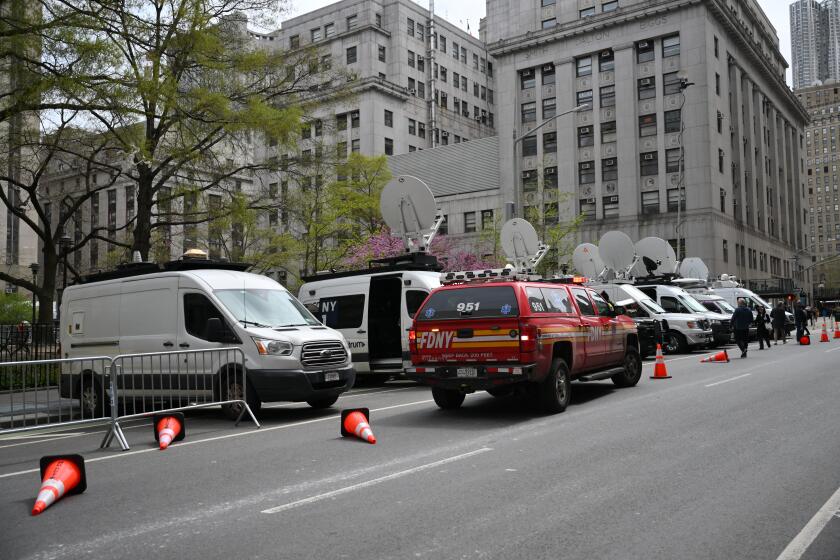Arrival of Karadzic puts tribunal back in spotlight
The extradition of Radovan Karadzic to the war crimes tribunal at The Hague is being hailed as a triumph for the pursuit of international justice and a potential deterrent to brutish leaders tempted to flout the law.
But the fact that it took 13 years to apprehend Karadzic tempers the celebration and raises new challenges for the much-criticized court.
The passage of time also has resulted in lesser, and perhaps more realistic, expectations of the benefits the trial can produce. And that, some experts say, may actually be a good thing: Using the trial to establish a historical record of the war in Bosnia-Herzegovina is a lofty goal that can be at odds with a timely prosecution and verdict.
As it prepares to try Karadzic, the tribunal will nonetheless be hard-pressed to prevent the proceedings from turning into the type of unwieldy and ultimately inconclusive spectacle that was the hallmark of the prosecution of Slobodan Milosevic, the former president of Yugoslavia and most prominent defendant to reach The Hague.
“It will be a complex trial, but we are fully aware of the importance of being efficient,” Serge Brammertz, the tribunal prosecutor, said Wednesday at The Hague, a few hours after Karadzic’s predawn trip there on a Serbian government jet.
Karadzic, a fugitive for more than a decade until his capture this month, will make his first appearance in court today and will be asked to enter a plea. He faces multiple counts of genocide, murder, torture and other crimes against humanity -- a catalog of the most egregious abuses committed in Europe since World War II, aimed, the indictment alleges, at eradicating or subduing Bosnia’s non-Serb population during the 1992-95 war.
“The arrest of Radovan Karadzic is immensely important for the victims who had to wait far too long for this day,” Brammertz said. It shows “that there is no alternative to the arrest of war criminals and that there can be no safe haven for fugitives.”
One of the founding premises of the International Criminal Tribunal for the Former Yugoslavia was that establishing the personal responsibility of individuals for wartime atrocities would help end the demonization of entire ethnic groups. If the people of the Balkans understood that evil deeds were committed by corrupt, power-hungry leaders, they could move beyond the war and coexist peacefully once again.
The work of the tribunal, by documenting specific massacres and formally recording the testimony of witnesses and survivors, was also designed to counter the tendency of some to deny that such brutal events took place.
Though justice has seemed delayed and fleeting to many of the region’s hundreds of thousands of victims, the tribunal has succeeded in taking some nefarious characters out of circulation.
“By indicting and prosecuting major war criminals, the tribunal has prevented these people from polluting the region’s politics, allowing more moderate forces to emerge in all parts of the former Yugoslavia,” said Alexander Greenawalt, an expert in international justice at Pace Law School in New York. “This is a different place than it was during the war, and the tribunal . . . has contributed to this reality.”
In the case of Karadzic, though he long remained at large, he was forced by the indictment to leave politics, drop out of sight and adopt an assumed identity and alternate lifestyle. His arrest hands the tribunal its most important defendant after Milosevic, and offers it a chance to burnish its image and boost its credibility in the world of international justice.
The tribunal has tried 66 Serbs, Croats, Bosnian Muslims and ethnic Albanians from Kosovo, with prosecutors winning 56 convictions.
But the court has also been criticized for sluggish, expensive bureaucracy and accused of lapsing into overly political prosecutions. The United Nations Security Council had ordered it to be dismantled by 2010, a deadline certain to fall by the wayside with Karadzic’s arrival.
A Karadzic prosecution “revives the tribunal’s institutional relevance and gives it an extended lease on life,” said Timothy Waters, a law professor at Indiana University in Bloomington who has worked for the tribunal.
“This is their big trial, and there are enormous institutional hopes resting on it. But there are also risks to that.”
The risks include allowing the Karadzic trial to elongate beyond the specific charges, putting off a resolution.
Karadzic has vowed to represent himself, and there are concerns he will use the trial as a platform to expound on his political views, much as Milosevic did, in one of the low points in the tribunal’s proceedings.
The Milosevic prosecution dragged on for four years, with the former leader railing against witnesses and challenging the court’s jurisdiction, until he died of a heart attack in 2006.
There are important differences between the two cases: The lawyers prosecuting Milosevic had to establish his responsibility for war crimes in three countries, including Croatia and Bosnia, where he had no formal leadership position.
For Karadzic, the former president of the self-declared Bosnian Serb Republic who is accused of crimes solely in Bosnia, the geography is limited and the chain of command clear.
“My guess is the prosecutors will have learned their lesson from the Milosevic trial and will have a much more focused approach,” said Terree A. Bowers, a Los Angeles attorney who worked with the tribunal in its early years and became legal coordinator of its investigations section.
“And the judges will have to maintain control over the proceedings and can’t be afraid to prevent the defense from going off on tangents.”
Brammertz, the prosecutor, said the start of Karadzic’s trial is probably months away. In the meantime, the defendant will reside in a 17-by-10-foot cell at a maximum-security prison outside The Hague.
--
More to Read
Start your day right
Sign up for Essential California for news, features and recommendations from the L.A. Times and beyond in your inbox six days a week.
You may occasionally receive promotional content from the Los Angeles Times.







